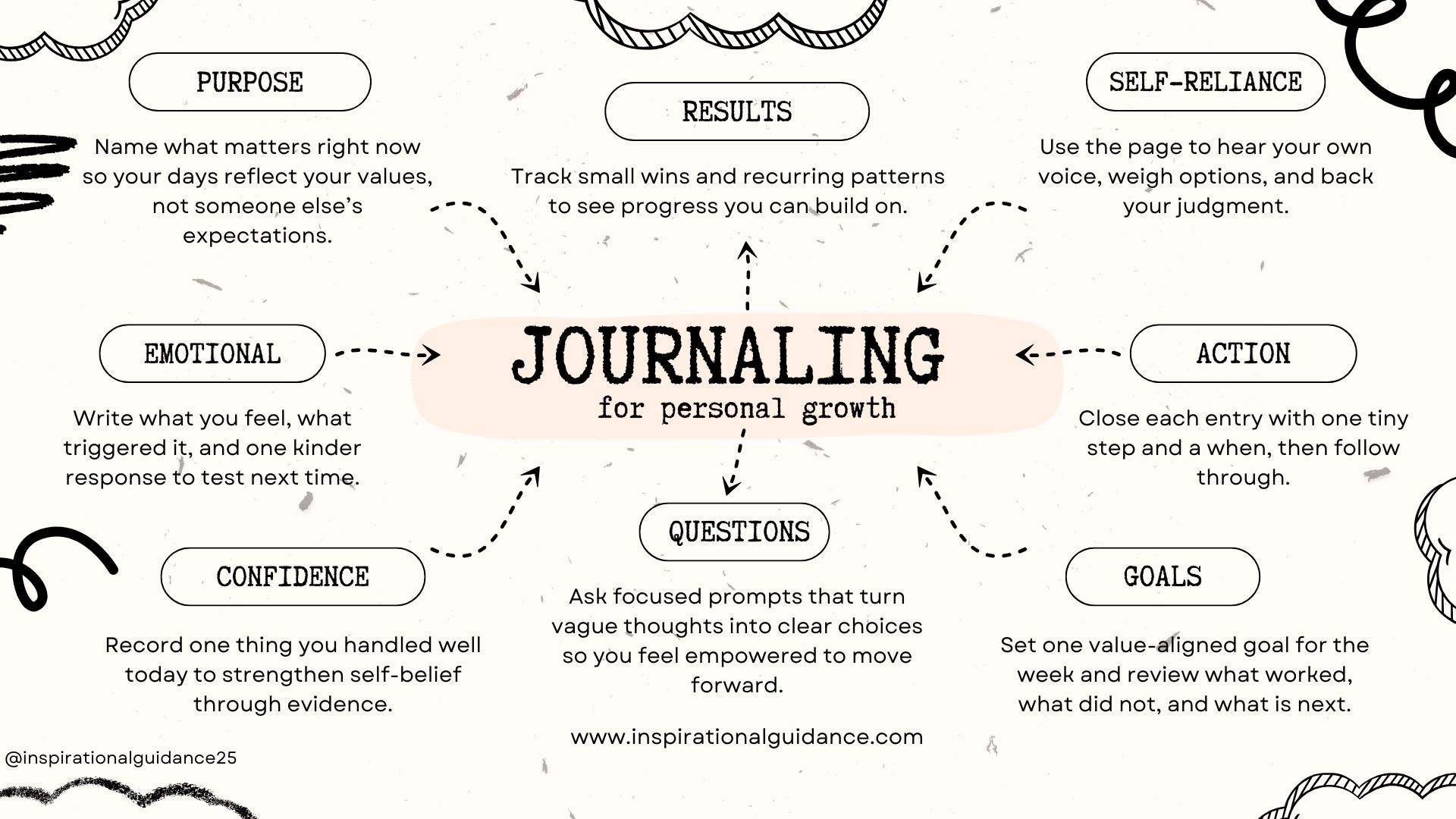Journaling for Personal Growth: A Practical Guide for Women
Journaling is not about perfect sentences. It is a 10-minute habit that helps you think clearly, make value-led choices, and steady yourself when life gets loud. This guide shows you how to use journal writing for purpose, resilience, confidence, and self-reliance and how to turn insights into action.
“I don’t know what I think until I write it down.” - Joan Didion
What is Journaling for Growth?
A simple practice of putting thoughts on paper so you can see them, work with them, and choose your next step with intention. Used consistently, journaling becomes a private space to clarify values, process emotions, and plan small moves that add up.
- Clarity: Writing slows your thinking so priorities become visible.
- Emotional processing: Naming feelings reduces their intensity and helps you respond instead of react.
- Evidence: Pages become proof of progress, which strengthens self-trust.
- Action: Notes turn into micro-plans you can follow in real life.
The Six Steps
Journal for Purpose
A 10-minute daily check-in to align days with your values and direction.
Read moreJournal for Emotional Resilience
Process feelings, spot patterns, and bounce back with steadier decisions.
Read moreJournal for Confidence
Use targeted prompts to strengthen self-belief and take the next step.
Read moreJournal for Self-Reliance
Build trust in your own judgment and choices through regular reflection.
Read moreUse a Prompt Generator
Short on time? Generate focused prompts by theme and session length.
Try itTurn Insights Into Action
Integrate what you learn so your pages translate into real-life change.
Read more
Journal for Purpose
Use a short daily practice to check your actions against your values. Try a one-line “What mattered today?” entry to keep your direction front-of-mind.
Journal for Emotional Resilience
Name the feeling, note the trigger, write one supportive response you will try next time. Patterns will emerge—and so do options.
Journal for Confidence
Collect evidence. One win a day, no matter how small. Your written proof becomes belief.
Journal for Self-Reliance
Use reflective questions to back your own judgment. Decisions get clearer when you write the reasons behind them.
Use Prompts When Stuck
Prompted writing reduces friction on busy days. Set a 10-minute timer and keep the pen moving.
Turn Insights Into Action
Finish each entry with one micro-action you will take. Small steps compound faster than sporadic overhauls.
Quick Answers to Common Journaling Questions
How do I start journaling if I only have 10 minutes?
Use the 10-minute purpose practice. Focus on values, direction, and one next step. Full guide →
What prompts help me find my purpose?
Start with value-clarifying questions and “one-sentence life statement” drafts. See prompts →
How can journaling improve my emotional resilience?
It helps you name feelings, track triggers, and plan steadier responses. Learn how →
Is there a tool that gives me prompts on demand?
Yes—use our prompt generator and filter by theme and time. Try it →
Can journaling help build my confidence?
Use targeted reflection questions that keep you moving when doubt shows up. Prompts here →
How do I turn insights into real change?
Close each entry with a micro-action and review weekly to integrate lessons. Step-by-step →

Featured Articles on Journaling
Journal Your Way Into Purpose: A 10-Minute Daily Practice
Use a short routine to align days with what matters.
What Journal Prompts Help Me Discover My Purpose?
Clarity questions to move from noise to direction.
Journaling - An Underrated Tool
Journaling. The Most Underrated Tool for Women Who Want to Understand Themselves Better.
Why Journal Writing is a Key to Empowerment
Build self-trust and back your decisions.
Journaling For Personal Growth
Each pathway is a simple lens you can bring to your journal that turns reflection into growth.
Empowering Questions for Self-Confidence
Prompts to steady your inner coach.
Free Journal Prompt Generator
Use our prompt generator for variety. Perfect for days when your brain is too full to think but too busy to rest.

FAQ
How long should I journal?
Ten minutes is enough to make consistent progress. Aim for most days, not perfection.
Paper or digital?
Use whatever you will stick with. Many start on paper for focus and later move to digital for searchability.
What if I miss days?
Resume without apology. Write one line today. Momentum returns faster than you think.
Do I need prompts?
Prompts reduce friction and spark depth. Keep a shortlist and use the generator when you feel stuck.
Related Pillars
Live With Purpose
Use your journal to align choices with values.
Emotional Resilience (PAUSE)
Pair journaling with PAUSE to recover quicker.
Empowered Living
Use reflective writing to back your decisions.
Self Authorship
Self‑authorship is the ability to define your beliefs, identity, and direction on your terms.
Build Self-Confidence
Aligned action builds self‑trust — and self‑trust fuels purpose.
Personal Growth Resources
Free personal development tools to continue your personal growth.
Reflection
This week, write one line a day: “One thing that mattered and why.” Keep it visible. Small evidence builds big change.